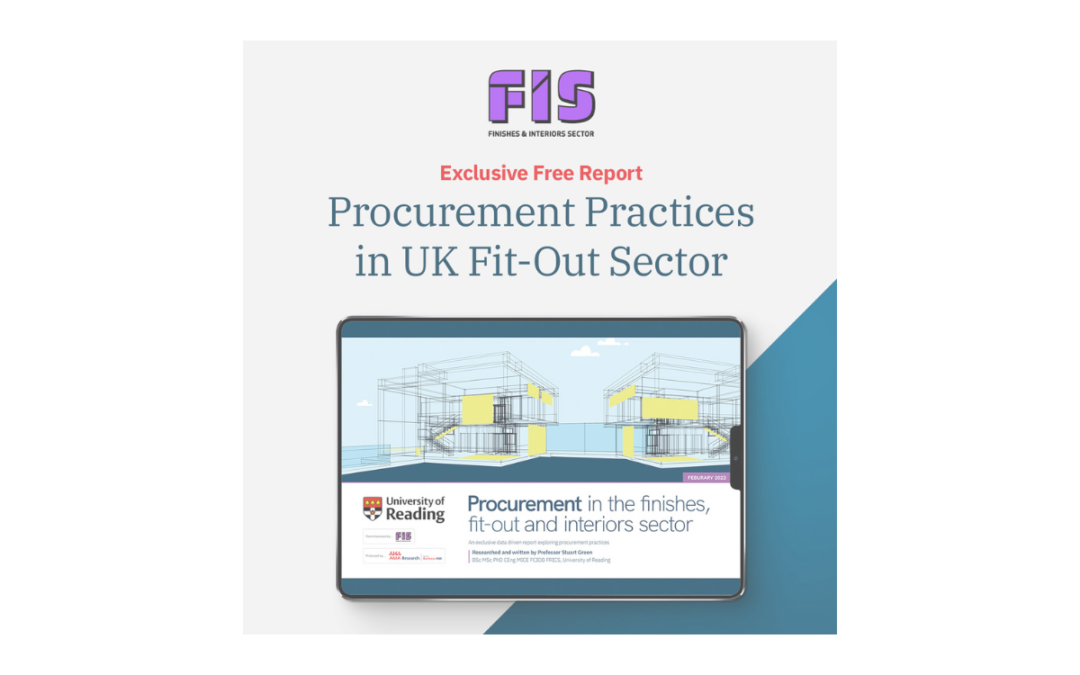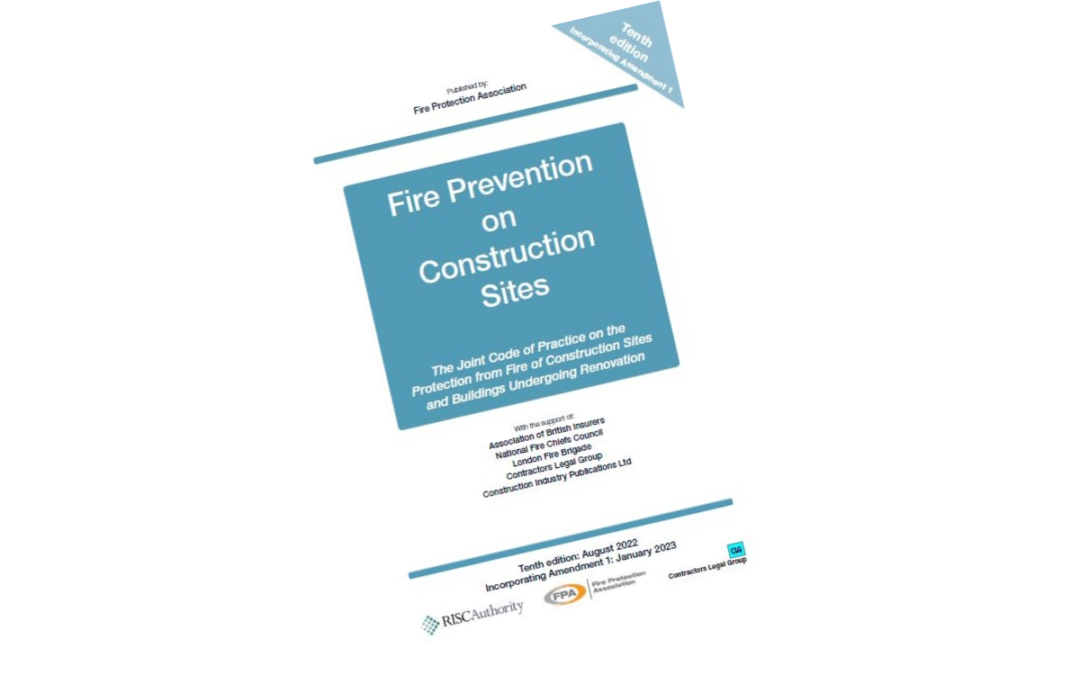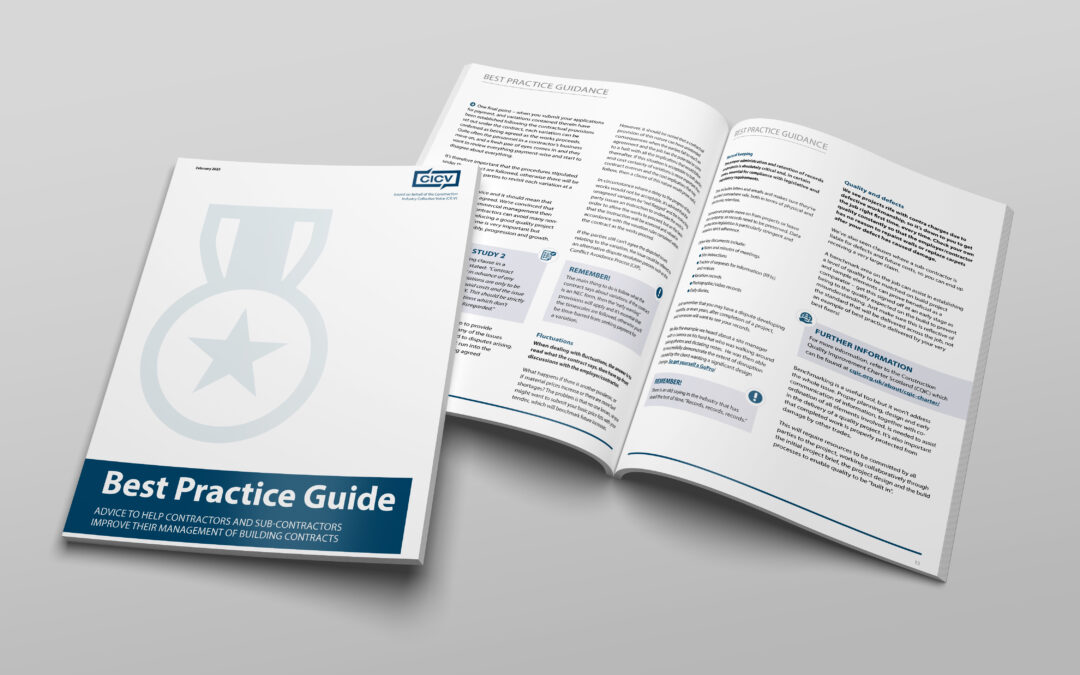
by Clair Mooney | Mar 9, 2023 | Drylining, Technical
FIS has today launched two new expert guides; a Pre-construction Guide for Drylining and a Construction Site Guide for Drylining. They are an invaluable resource for the industry and aim to reduce risk, ensure compliance and guarantee that projects are delivered on time, and to budget.
The guides have been produced off the back of concerning results gathered from an FIS Survey into Challenges in the Drylining sector. The survey found that amongst its member base, 97% of organisations had been asked to commence construction without having sufficient information to accurately detail the installation of the work. Wider discussions had resulted in a number of concerns being raised linked to a lack of standardisation in design detailing required. To start to address this, the FIS Drylining Working Group, which is comprised of manufacturers, designers and contractors working in the drylining sector, produced the guides to continue the provision of information and guidance to the point of installation.
The Pre-construction Guide for Drylining has been pulled together from decades of experience and focuses on the lead-up to commencing installation works. It highlights how to check bids and tenders for compliance, understand time requirements and site conditions, and ensure the design information is sufficient and fit for purpose.
The Site Guide for Drylining provides expert knowledge on preparatory work, sequencing, the checking of design information, how to recognise common issues and address them, and also how to perform quality checks to ensure building compliance.
Commenting on the guides, Iain McIlwee, FIS Chief Executive said:
“Drylining systems form firewalls, fire escape routes and provide passive internal fire protection so it is incredibly important to get it right at all stages of installation and this has to start far earlier and long before boots hit the ground. Our new guides allow professionals to reduce risks, support compliance and most importantly of all encourage responsible planning.”
The guide sits alongside other FIS best practice guides that relate to drylining:
The guides utilise the information, knowledge and good practice employed by its members and deliver a valuable resource for improving works package delivery, enhancing quality and aiding projects to be finished on time, safely and within budget.
FIS members can download both the Pre-construction Guide for Drylining and the Site Guide for Drylining at https://www.thefis.org/membership-hub/publications/site-guides/

by Clair Mooney | Mar 9, 2023 | Main News Feed
The Construction Industry Joint Council (CIJC) has issued a a revised Promulgation Notice to reflect the increases in the National Living Wage and National Minimum Wage which will come into effect on 1 April. The General Operative rate is the only one directly impacted by the changes and has increased to £10.42 per hour.

by Clair Mooney | Mar 9, 2023 | Main News Feed
Open Doors 2023 gets underway next Monday 13 March and will provide an opportunity for people to take a look behind the hoardings of more than 230 sites across Great Britain during the week! From HS2’s Old Oak Common Station in London to Perth City Hall being refurbished by BAM in Scotland and Willmott Dixon’s BIM Cave ‐ VR Room to CITB’s National Construction Colleges, we know that seeing construction in action can directly lead to a new entrant joining our industry.
Kier, an Open Doors Industry Partner, has highlighted in Building the importance of actually showing young people how construction is “shaping the way we live, travel, work and learn for the better”, so please get out and about to support your sites next week and “give people the confidence to dream big and pursue a career right here in construction”!
You can support Open Doors on social media using the hashtag #OpenDoors23

by Clair Mooney | Mar 9, 2023 | Building Safety Act
Build UK has updated its comprehensive guide, to the building safety regime to reflect the latest secondary legislation and guidance that has been published. Changes in the March 2023 version include:
Described as “the most straightforward and comprehensive piece of guidance around this issue”, the Build UK guide is designed to ensure all members are aware of their responsibilities, the new bodies that will oversee the regime, and the reforms to existing legislation which may extend liability. The next update will be published in early April.

by Clair Mooney | Mar 8, 2023 | Skills
Employers can now receive expert advice and support from sector specific networks, as part of the Construction Industry Training Board’s (CITB) employer network pilot. As well as the local training networks, selected sectors will also be supported making it even easier to find and fund appropriate construction training.
The CITB pilot launched its local training networks in August 2022 with an initial £800,000 investment. With a focus on connecting employers to established and experienced delivery partners, the aim is to help employers recognise their training priorities and the best routes to achieving them. This transformative way of working provides a huge opportunity for employers to not only voice their training requirements, but also play a fundamental role in deciding how funds are used in their local area.
The 12-month local initiative is available to 3,800 levy-registered construction businesses and offered across five locations in England, Scotland, and Wales. One business already reaping the rewards is Aspect Group Services Ltd. The East Anglian business provides various services across roofing, scaffolding, property refurbishment and development, and was informed about the employer network pilot through the Norfolk Construction Training Group (NCTG).
Katie Laws-Chapman, Aspect Group Services Office Manager, said: “Initially we were hesitant, as we were accustomed to claiming training back from CITB through the usual process. However, through discussions with our contacts at NCTG, we were assured the process would be simple and we would have greater benefits due to the wide scope the employer network covered. As we are a mix of site-based operatives and office-based staff, we were able to request support for a wider variety of courses than previously possible. It was very beneficial to be able to combine both sets of training requirements for our staff through the employer network.”
FIS is working with CITB to involve the Fit Out and Interiors Sector Training Group (FISTG). If you need any information advice or guidance on claiming funds for training please contact Marie Flinter on 07799 903103 or email marieflinter@thefis.org or book a skills and funding clinic here.

by Clair Mooney | Mar 8, 2023 | Health and Safety, Main News Feed
The Condor Collective are partnering with The FIS on Project Happiness; to better understand the metrics around topics such as mental health, retention, apprenticeships, collaboration, communication and general happiness of the people and businesses that make up the fitout sector.
The Outlook: Construction and the fit-out sector
Construction contributes £117 billion to the UK economy (6%) with 2.4 million jobs in the sector, 7% of the UK total. You are an important bunch!
According to the latest Construction Skills Network (CSN) report an extra 225,000 construction workers may be needed by 2027 to keep up with projections. This means the Greater London construction industry would have to increase current recruitment by 3,450 new workers each year to deliver expected projects, in addition to retaining its current workforce.
For the industry to meet increasing demand, it is imperative that construction leaders have useful and relevant data to inform their decisions around engagement, attraction and retention. Culture and employee engagement are crucial metrics for any construction company in the current climate.
For business leaders to be fully informed, they need access to up-to-date, sector specific benchmarking data relevant to size and location of their business. With this information leaders and employees can more accurately compare, and learn about the successes and challenges most applicable to them.
How will Project Happiness help business leaders?
The benchmark data gathered in this process will inform business leaders of engagement within the fitout sector, allowing leaders to make informed decisions on engagement and impact retention for their own teams.
All FIS members who participate & qualify* will receive their own set of results against the benchmark data.
Sample questions:
“I still see myself working at my company in two years’ time” – The data we gather around questions like this will deliver insights on an individual business’ retention, as well as loyalty & overall engagement levels in the fitout sector.
“My manager coaches me and supports my professional development.” – The data we gather around questions like this will deliver insights on career progression & development and engagement derived from purpose & mastery in the fitout sector.
“Decisions are communicated clearly and openly by the leadership team.” – The data we gather around questions like this will deliver insights on company cultures in the fitout sector and to what degree are businesses adopting modern leadership practises.
“I would feel comfortable discussing my mental health with someone at my company.” – The data we gather around questions like this will deliver insights on how individual businesses are investing in support and allow us to benchmark how well the sector is ensuring mental health support & training is a priority.
Employees, why participate?
We want to hear from as many employees working in the fitout sector as possible on topics such as engagement, leadership, learning & development, collaboration & communication in fitout companies and across the sector.
This mass data capture will provide a snapshot of how the sector approaches employee engagement, and from the insights we will be able to look at what can be improved not only to retain employees at business level, but also attract new people into fitout.
This is an opportunity for all employees to have a voice and a platform to report on how they feel their employer is performing and how they feel about the industry as a whole. The more people who participate, the clearer the picture we gain insights in to.
All employees who complete the survey before the 1/7/2023 will be entered into a draw to win a £250 gift vouchers!

by Clair Mooney | Mar 7, 2023 | Contractual and Legal, Main News Feed
FIS Consultant Len Bunton looks at the importance of keeping records and why this is vital. It is not uncommon for disputes to emerge on contracts that were concluded 3-4 years ago, so your records need to be collated and stored and archived, because you never know when you might need them.
These monthly Blogs are designed to help FIS Members avoid common traps and build on our focus on collective experience. They share ideas about improving the commercial management of your contracts. In other words, instilling best practice into the way FIS members run and manage their business. What I have endeavored to suggest is ways to ensure you get paid on time, and what you are due.

by Clair Mooney | Mar 7, 2023 | Market data
The CPA has produced an economic update which details:
- ONS UK Construction Materials Price Indices (January 2023)
- ONS UK Construction Employment by Age-demographic (2022 Q4)
- Bank of England UK Mortgage Approvals (January 2023)
- BEIS UK Brick Sales (January 2023)
- Nationwide House Price Index (February 2022)
- Persimmon Full Year Results (March 2022)
- Taylor Wimpey Trading Update (March 2022)

by Clair Mooney | Mar 1, 2023 | Main News Feed
FIS announced the winners of its inaugural Innovation Awards at a ceremony held at is Conference in London.
In front of a packed audience at the Business Design Centre, the winners of the 2023 FIS Innovation Awards were announced and presented. The Awards recognise and celebrate innovation in the finishes and interiors sector showcasing companies that are paving the way for greater efficiency and collaboration. The aawards comprised four categories: Product Fit-Out, Product FF&E, Digital and Sustainability.
All entries were independently assessed by a panel of expert judges and the winner of each category was announced in front of a live audience. The winner of each category was then invited to deliver a short pitch on their innovation to the audience, who then determined the overall 2023 Innovation of the Year winner.
The 2023 award winners are:
Innovation of the Year
FireDNA for its Passive Fire Product Monitoring Software
Product – Fit Out
Eekowall for its off-site manufactured eekowall panels]
Product – FF&E
Rockfon for its modular slatted wood acoustic wall system, Lamella
Sustainability
Adaptavate for its plasterboard alternative, Breathaboard
The awards and event were supported by sponsors Etag Fixings, Protektor, Fire DNA and Payapps.

by Clair Mooney | Feb 27, 2023 | Main News Feed
The University of Reading, Finishes and Interiors Sector (FIS) and AMA Research (part of Barbour ABI) have today launched a new report Procurement in the Finishes, Fit-Out and Interiors Sector, aiming to better understand how procurement practices are affecting the £10 billion fit-out industry and most importantly, how they can be improved.
FIS last year raised concerns that the push for modern methods of construction was being undermined by lack of focus on modern methods of procurement. To better understand the evolution of procurement practices, the organisation commissioned Professor Stuart Green of the University of Reading to explore procurement practices in the UK fit-out sector. FIS has a close working relationship with AMA Research, who were also keen to explore this topic and support this work and were able to offer assistance in developing the survey and extending the reach for participation.
This result is a fascinating new report that benchmarks current practices from those contractors directly involved and explores how procurement impacts effective delivery. Through better understanding of the challenges facing the industry, the sector can deliver better value and improve supply chain relationships.
The nature of the procurement process is often identified as a barrier to change. Dame Judith Hackitt’s statement from the 2018 ‘Building a Safer Future’ Report, confirmed that ‘Improving the procurement process will play a large part in setting the tone for any construction project. This is where the drive for quality and good outcomes, rather than lowest costs must start.’
FIS Chief Executive Iain Mcllwee stated:
“The key to unlocking the potential of construction and unleashing the culture change that we need in the finishes and interiors sector sits squarely in procurement. That isn’t a revelation. Virtually every report written about the construction process has raised concerns about procurement practices that facilitate a race to the bottom and create adversarial relationships and it crops up in almost every conversation I have about improving the sector. This is felt most acutely in our sector which absolutely sits at the whip end of construction when programmes and budgets are stretched or there is huge pressure to get the work done to leverage the value of a building.”
This new report furnishes the ongoing debate with concrete data and provides a voice to those who work in the fit-out sector. It is based on both a questionnaire conducted online during July and August 2022 that returned 269 responses with 100% quality rating on results and then supplemented with 20 in-depth interviews with selected practitioners representing contractors operating at all tiers of the supply chain. The research raised serious questions about time allocation in procurement and tendering processes, and worryingly how risks are routinely pushed down the supply chain.
Professor Stuart Green, School of Construction Management and Engineering at the University of Reading said:
“I have been hugely impressed with the leading-edge firms in the fit-out and interiors sector. They are crucially focused on delivering high-quality work to demanding deadlines. Such firms act as exemplars for collaborative working at its very best.
“But many firms within the sector don’t get the chance to work collaboratively. This is especially true of the smaller firms who act as subcontractors. Procurement practices are too often focused on low-cost tendering with little consideration of other factors. Subcontractors are further obliged to accept highly onerous conditions of contract which undermine trust from the outset. The smaller firms are frequently pressurised to reduce their tender price retrospectively and to offer discounts in return for prompt payment. It seems that old-fashioned subbie bashing is alive and well in the fit-out sector. This cannot be the basis upon which to sustain a modern industry.”
Laura Pardoe, Director at AMA Research said:
‘Connecting with people working directly in the field helps understand the real issues they are dealing with daily. This is critical to being able to decipher what needs improving. It has been a pleasure to support FIS in reaching out to people across their sector to canvass views and gather thoughts and experiences. The objective perspective we can bring as an expert researcher provides robustness to our understanding across the array of issues uncovered.’
In conclusion, Iain Mcllwee said:
“The regulatory, environmental, commercial and moral drivers for change have never been stronger and this research-based report has given a voice to all in the supply chain and is the start of a practical call to action for positive change.”

by Clair Mooney | Feb 23, 2023 | Skills
To support construction workers to transition from an Industry Accreditation (IA) card to a qualification, CITB is increasing the grant for specific supervision NVQ Diplomas/SVQs to £1,250 and specific management NVQ Diplomas/SVQs to £1,500 for achievements from 1 April 2023 as listed below
| Supervision |
Management |
| Level 3/SCQF Level 6 in Built Environment Design |
Level 6/SCQF Level 10 in Construction Site Management |
| Level 3/SCQF Level 6 in Construction Contracting Operations – [any subcategory] |
Level 6/SCQF Level 9 in Built Environment Design Management |
| Level 3/SCQF Level 6 in Site Inspection |
Level 6/SCQF Level 9 in Construction Contracting Operations Management – [any subcategory] |
| Level 3 in Surveying, Property and Maintenance |
Level 6 in Senior Site Inspection |
| Level 4/SCQF Level 7 in Construction Site Supervision |
Level 7/SCQF Level 11 in Construction Senior Management |
| Level 3/SCQF Level 6 in Built Environment Design |
Level 6/SCQF Level 10 in Construction Site Management |
CITB registered organisations have been able to claim £600 for each trade vocational qualification (VQ’s) completed for PAYE and LOSC people. Organisations can claim this regardless to whether they meet the construction industry levy threshold and pay the levy, you just need your CITB registration number.
There is an additional £400 for Rainscreen Cladding VQs achieved from 1 April 2022, on top of the usual £600, giving a total grant value of £1,000. There’s £300 for each achievement of a plant related Level 2 VQ unit, up to a maximum of three per individual. The plant VQ unit achievements are also included in the cap of four Level 2 achievements per individual e.g., Interior Systems VQ’s for Dryliner can include, Fixer plus Boarder plus Finisher plus Fire resistant wall installer making four level 2 ahievements.
The Construction Skills Certificate Scheme (CSCS) has announced its plan to move all Industry Accreditation (IA) cardholders to a recognised qualification. You can find more information on the withdrawal of Industry Accreditation by visiting the CSCS website here.
If you need any help to secure funds for the training you provide for employees have a look at the FIS web site: Skills and Funding or give Marie Flinter a call on 0121 707 0077 or email marieflinter@thefis.org

by Clair Mooney | Feb 23, 2023 | Health and Safety, Technical
The Joint Code of Practice for Fire Prevention on Construction Sites was first published in 1992 with the objective of preventing fires on construction sites. Now in its 10th edition, the code has been revised and re-issued to ensure it continues to address not only long-standing risks such as hot work, but also reflects changes in standards, practice and the more prevalent use of modern materials and construction methods.
Excerpt from the Code of Practice:
“Every year there are numerous major fires on construction sites and in buildings undergoing refurbishment. All have serious consequences: people are killed and injured; buildings, including those of historic interest, are destroyed. Plant and equipment is damaged, work is held up and completion dates are not met.
The objective of this Code is the prevention of fires on construction sites. The majority of fires can be prevented by designing out risks, taking simple precautions, and by adopting safe working practices. All parties involved must work together to ensure that adequate detection and prevention measures are incorporated during design and contract planning stages; and that the work on site is undertaken to the highest standard of fire safety, thereby affording the maximum level of protection to the Building and its occupants.”
Click here to download a free copy of the latest guide

by Clair Mooney | Feb 21, 2023 | Skills
The CITB Strategic Plan will set out where they focus their efforts from 2024-2028 and they are seeking feedback about where CITB should prioritise investment.
This is your chance to tell them about what matters to you and the support that you need. By sharing your views, you will help shape CITB future priorities and the support they provide.
Complete our short online survey to have your say.
This is an opportunity for FIS members to contribute to what CITB invest the construction industry levy in, an opportunity that should not be missed. If you would like to discuss this further, contact FIS on 0121 707 0077 or email info@thefis.org
About the Strategic Plan
CITB’s Strategic Plan 2021-25, published in September 2020, sets out the key skills challenges for construction and what CITB will do to address them.
Amid an unpredictable landscape, CITB have focused on a smaller number of priorities to help modernise construction and increase productivity, collaborating with industry, governments and further education (FE). As well as providing direct support to employers, CITB will use this period to help fix the system, making it easier to recruit workers into the industry and to access training.
The Strategic Plan supports employers to bring people into work and provide the training they need. The Plan includes expanding work experiences, creating a new pathway from FE into apprenticeships and jobs, and boosting the numbers of apprentices completing their programmes.
Highlights from the Strategic Plan include:
- Investing £110m to support apprentices and employers, on top of grant support, to increase overall numbers and completion rates.
- Support for 28,000 taster experiences and investment in Go-Construct to give people the chance to see the wide range of opportunities construction offers and how to access them.
- Using the Grants Scheme and other funding to help employers invest in training to first rebuild after the pandemic and then to modernise and raise productivity.
The Strategic Plan was developed during discussions with employers, employer bodies and CITB Board and Nation Council members.
Read the Strategic Plan here

by Clair Mooney | Feb 21, 2023 | Market data
The Construction Products Association’s latest State of Trade Survey for 2022 Q4 revealed a quarter of mixed fortunes for the construction product manufacturing industry. Performance was split between a decline in sales for heavy-side producers and continued growth for manufacturers on the light side. Furthermore, manufacturers expect these dynamics to persist in 2023, with new build starts affected by economic uncertainty but refurbishment and activity for energy-efficient retrofit continuing apace.
In 2022 Q4, 20% of heavy-side manufacturers reported that sales of construction products declined, marking a second consecutive quarter of decline. In contrast, 27% of light-side manufacturers reported that product sales rose, which extended a run of growth to ten straight quarters.
In the Q4 survey, demand was viewed as the key constraint on manufacturers’ activity going forward. On balance, one-third of heavy-side firms, whose products tend to feed into the earlier stages of construction, anticipated a decrease in sales over the next 12 months, with two-thirds citing demand as their key concern. On the light side, a balance of 8% of firms anticipated a rise in sales during 2023.
Rebecca Larkin, CPA Head of Construction Research said: “It was a mixed bag for construction product manufacturers at the end of last year, with demand in some areas of construction knocked by renewed economic uncertainty following the Truss government’s Mini Budget, as well as early signs that historically high inflation was stalling household spending and business investment decisions. This primarily affected heavy side manufacturers, who experienced a fall in sales for products that are typically used at the earlier stages of construction as demand and confidence weakened for new build project starts. Sales growth continued for light side manufacturers in Q4, however, and is likely to have been buoyed by areas of construction that are still experiencing strong activity, namely offices refurbishments and energy-efficient retrofit such as insulation measures.”
Key survey findings include:
- A balance of 20% of heavy-side firms reported that construction products sales fell in Q4 compared with Q3, marking a second straight quarter of falling sales
- 27% of light side firms reported product sales rose, the tenth quarter of growth
- One-third of heavy-side manufacturers anticipated a decrease in sales over the next 12 months; 8% of light-side firms anticipated a rise in sales
- Fuel, energy and raw materials costs rose for all heavy-side manufacturers
- Overall costs are expected to increase over the next year according to balances of 69% on the heavy side and 62% on the light side, the lowest balances since mid-2020
Overall, the Q4 survey highlights the varied demand by the construction sector and adds to the signs pointing to a slowdown in activity across new build or sectors that are driven by consumer or business confidence, which will be partially offset by high levels of activity on commercial refurbishment and energy efficiency improvements.

by Clair Mooney | Feb 16, 2023 | Skills
CSCS will cease renewing cards issued via Industry Accreditation (IA) from 30 June 2024, while all IA cards issued from 1 Jan 2020 will expire on 31 Dec 2024 and will not be renewed. Below, CSCS have provided responses to some of the common queries and questions around IA, as well as information on how they can be resolved.
IA was a mechanism by which workers could obtain CSCS cards on the strength of an employers’ recommendation rather than the achievement of a recognised qualification. CSCS stopped issuing new cards under IA back in 2010, but if you previously held a card under IA, the scheme rules allowed you to continue to renew.
CSCS together with our 37 partner card schemes, are bound by the Construction Leadership Council’s (CLC) requirement that all construction industry card schemes must operate with nationally recognised qualifications (usually NVQs and Apprenticeships) in place for all occupations. This requirement is particularly important when addressing the IA issue. Further details on the withdrawal can be found here.
To satisfy the Construction Leadership Council’s requirements, CSCS announced plans to withdraw cards issued under IA, which include:
- IA cards issued from 1 Jan 2020 will expire on 31 Dec 2024 and will not be renewed
- CSCS will cease renewing IA cards from 30 June 2024.
There are four ways to move off IA:
- Vocational qualifications already achieved: cardholders who have achieved the qualifications for their occupation can renew their card for the full five-year term as normal.
- Academically Qualified person card: This card is available to people who have completed certain construction related degrees, HNDs, HNCs, CIOB Certificates and NEBOSH diplomas.
- Professionally Qualified person: This card is available to competence assessed members of CSCS approved Professional Bodies of which CIOB is one.
- Not everyone needs a card: There will be IA card holders who no longer require their CSCS cards. For example, you may have moved into a management role, become a director, or rarely visit site. In these scenarios, you do not require a CSCS card.
Those unable to fit into these four scenarios will be required to register for the appropriate qualification for their occupation before their cards expire in 2024. Those without qualifications will be required to register for the appropriate qualification for their occupation before their cards expire in 2024, however this does not mean attending college. Assessments can take place on site, remotely or via a professional discussion depending on the individual circumstances.
Costs will vary depending on a range of factors such as the training provider, qualification and assessment method. However, CITB grants are available to employers to assist with the cost involved. Those impacted are advised to read up on the options available to them and follow the interactive flowcharts available via CSCS Applying For Cards Industry Accreditation CSCS would also urge employers, trade associations, awarding organisations and training providers to put plans in place to support the workers affected ahead of the December 2024 withdrawal.
George Swann Skills and Training Lead said:
“if you are an AI card holder without a qualification FIS has Training Provider members who can help get the qualification applicable to your role. Contact FIS on 0121 707 0077 or email info@thefis.org and we may be able to get you your qualification free of charge”.

by Clair Mooney | Feb 16, 2023 | Skills
Last week saw the annual celebration of National Apprenticeship Week. The theme for 2023 was ‘Skills for Life’ and the week reflected on how apprenticeships could help individuals to develop the skills and knowledge required for a rewarding career and help businesses to develop a talented workforce that is equipped with skills for the future.
The week brought together businesses and apprentices across the country to shine a light on the positive impact that apprenticeships make to individuals, businesses and the wider economy.
To be interactive and engaged with our members, FIS published daily polls, following the themes of the day to understand members awareness of apprenticeships. Our poll results were inspiring and positive, demonstrating that FIS is working hard for its members to ensure they have the most up to date information and support on apprenticeships.
The results indicated we are getting the message out about apprenticeships, however, we could do more to influence our members in relation to those who may be hesitant to take apprentices on. 80% of businesses that took part in our poll have recruited an apprentice in the past and 57% are considering hiring an apprentice.
The FIS skills team will be proactive and follow up with those who were not quite sure about taking on apprentices (43%) to discuss benefits they bring, and any funding attached.
FIS has links with many education institutions, where member views are represented to make a change in the sector. It is good news that the Interior Systems Installer apprenticeship is preparing to be reviewed, with input from our members taken on board to ensure it is fit for purpose and adds value.
An area where a little more work is required is the awareness around T- Levels, with 55% of respondents not aware what a T-Level is. T-Levels are relatively new to the sector and FIS is on hand to offer advice and guidance to its members on how these qualifications can be integrated into their organisation to fill the skills gaps.
National Apprenticeship Week is an important tool in raising the profile of apprenticeships with schools, parents and young people who may not have considered apprenticeships as a viable career route. The week also highlights the value apprentices bring to employers. Our members who have recruited apprentices, have found great value and pride in making a difference to participants.
FIS is a great believer in celebrating success and showcasing the great benefits that apprentices bring to individuals and employers is no different. We have celebrated apprentices at our recent awards, where apprentices have won and shone a light on how undertaking an apprenticeship has enabled them to fulfil their ambitions and how they have been successful in their achievements.

by Clair Mooney | Feb 16, 2023 | Skills
Last year, the Construction Products Association (CPA) published the document Built Environment – Proposed construction product competence standard – white paper, proposing new competence requirements for all those using or otherwise working with construction products, and is now gearing up to develop a British Standard at BSI. This standard is due to have impact on the entire supply chain, and the CPA is keen to have input in the development from small contractors as well as large to ensure its practicality and usability.
The CPA is seeking a voluntary perspective to join the development group. The project will likely last between 18 months to two years, and though meeting frequency and input will vary according to the task, it will likely have a meeting at least once a month for two hours. The CPA appreciates that SME contractors may have limited resources, so would be willing to have a conversation exploring options as to levels of contribution.
To enquire about the position, or for further information, please contact Hanna Clarke by COP 3 March 2023.

by Clair Mooney | Feb 16, 2023 | Main News Feed

by Clair Mooney | Feb 15, 2023 | Main News Feed
The Construction Industry Collective Voice (CICV) has followed up the results of its recent payments survey by issuing a new Best Practice Guide to help contractors and subcontractors improve cashflow and prevent costly and damaging disputes
Compiled by more than a dozen industry experts, the in-depth guide offers a wealth of practical information, demonstrating how to take control and proactively deal with a range of issues to enhance the entire contractual chain.
As part of its mission to improve the sector, the open source publication is being supported by an upcoming webinar on Friday 3 March that will see experts from the CICV talk through the guide and offer further insights into preventing financial disagreements.
Both resources have been produced in response to last week’s CICV survey on payment and cashflow issues in the industry in Scotland, which revealed that businesses are still suffering the scourge of late payments, outstanding retentions and unexpected charges.
Iain McIlwee, FIS Chief Executive said:
“It has been great to work colleagues from across the CICV to develop this guidance. It is vital that the supply chain becomes more contractually aware and fully understands the risks they are being asked to carry. This document is something every contractor should use to ensure that they and their teams are contractually aware and making good decisions. It is a great training tool too for those joining the sector. The CICV is an amazing force for good and we are very proud to be part of it.”
Industry consultant Len Bunton, who is Chair of the CICV Pipeline and Commercial sub-group, said:
“Following the recent CICV survey, we concluded that the contracting supply chain needed some guidance on improving the commercial management of projects.
“Our highly-experienced contributors have walked through the construction process, giving their best recommendations on how to do things better day-to-day. A lot of the problems we deal with are self-inflicted, so we have gone back to the basics of improving the way in which commercial activities are carried out.
“This is not rocket science, but it’s clear the whole process needs a massive shake-up. Following publication of the guide and our webinar to take the supply chain through it, I am confident we can get change into the UK industry.”
As the latest initiative from the respected industry body, the Best Practice Guide is free to download from the CICV website and looks at a number of areas of interest, including:
- Tender qualifications
- Contract amendments
- Payment schedules
- Payment applications
- Payments received and value
- Variations
- Retentions
- Fluctuations
- Notices
- Record keeping
- Quality/defects
- Conflict Avoidance Process (CAP).
The guide has been drawn up by experts from a range of industry bodies, including Mr Bunton, Finishes and Interiors Sector CEO Iain McIlwee, Scottish Building Federation Commercial Director Ian Honeyman and the National Hub Programme Director of Scottish Futures Trust, David MacDonald.
Mr Honeyman said:
“Agreeing a mutually beneficial and collaboratively agreed contract is the first, vital stage in any construction project, and an area in which can lead to costly and damaging disputes.
“The CICV has therefore looked at the most common reasons for payments being delayed and changed, and has prepared this guide to help companies and individuals understand how to avoid them.”
CICV Chair Alan Wilson, who is also Managing Director of electrical trade association SELECT, said:
“Being paid on time and receiving what you’re due in full is essential for the survival and growth of every business, so this guide and accompanying webinar will help contractors and sub-contractors improve the commercial management of building contracts.”
The Best Practice Guide and webinar are the latest in a string of practical and constructive initiatives launched by the CICV since its creation as the Construction Industry Coronavirus (CICV) Forum in March 2020.
Made up of 28 trade associations, professional services bodies and companies, it has maintained a steady supply of information and practical advice to the sector as well as carrying out surveys, producing animations and posters, hosting webinars and maintaining close dialogue with Scottish Government ministers.
The CICV Best Practice Guide can be downloaded here and you can register for the upcoming webinar here.

by Clair Mooney | Feb 14, 2023 | Main News Feed
As construction output is expected to grow the finishes and Interiors sector needs to recruit new entrants iso that it can keep working. The STEM Ambassador Programme is partnered with the Construction Industry Training Board (CITB) to facilitate the Go Construct Construction STEM Ambassador scheme. Through this collaboration, they aim to showcase the amazing career opportunities in construction and inspire young people to work in the industry.
CITB approached FIS to produce presentation films designed to encourage young people to consider a career as a Dryliner. The films are now in the editing stage and should be available soon. Iain McIlwee and Oscar Venus have committed to become Construction STEM Ambassadors for the sector, mainly so they can provide advice to FIS members through their own experiences and encourage more people to become FIS Construction STEM Ambassadors. Marie Flinter has devoted time to learn and understand the scheme so she can offer support to those going through the process.
Go Construct STEM Ambassadors act as the face of the industry for young people, inspiring them to consider a career in construction and the built environment through sharing their experiences and promoting opportunities. The commitment is to be involved in at least two activities per year. Ambassadors lead a wide range of activities, including:
- Running a trade stand at a careers fair, answering questions and handing out leaflets.
- Delivering a talk, sharing your experiences of getting into and working in the industry.
- Leading practical sessions or workshops, giving young people a taste of life in construction.
- Providing one-to-one mentorship to someone who is just starting out.
- Helping teachers to develop curriculum resources and activities.
- Network with like-minded professionals, developing your own career as an ambassador.
Not only is becoming a Go Construct STEM Ambassador a great way to develop your employability skills and become a part of a community, through activities you will be helping to inspire the next generation of construction workers and change perceptions about the industry and the finishes and interiors sector!
Still need convincing, why not check out Go Construct’s top 10 reasons to become a GO Construct STEM Ambassador. Or give Marie Flinter a call on 0121 707 0077 or 07799 903103 or email marieflinter@thefis.org. If you are already a registered STEM Ambassador working in the finishes and interiors sector, please let Marie know, FIS will then be able to provide specific to your needs.





















